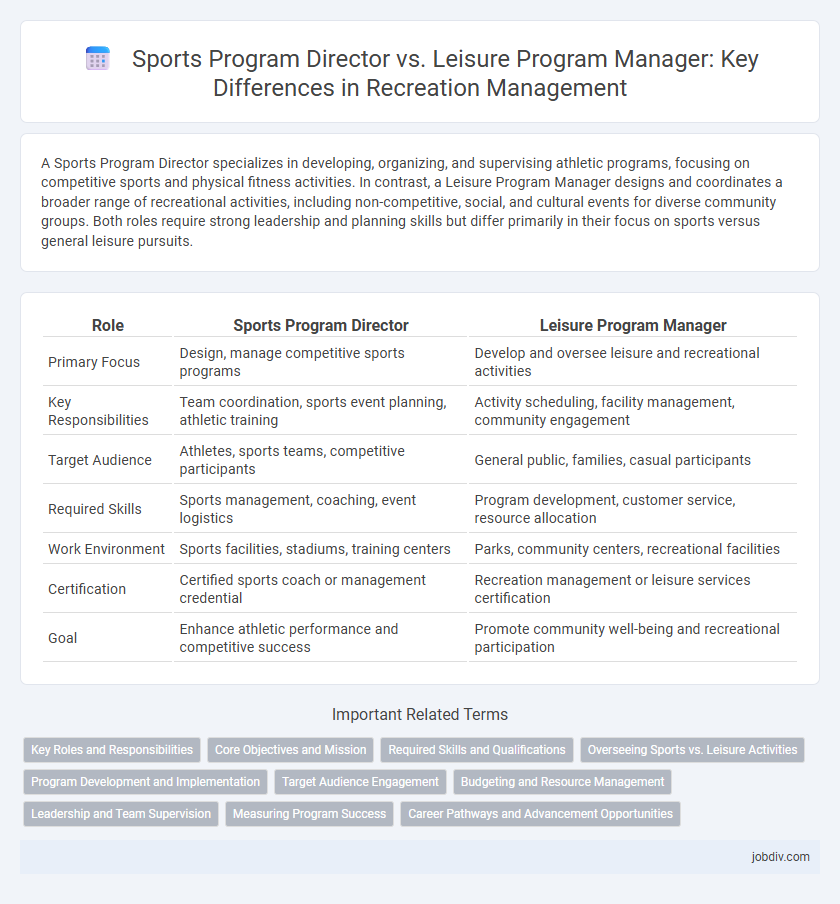A Sports Program Director specializes in developing, organizing, and supervising athletic programs, focusing on competitive sports and physical fitness activities. In contrast, a Leisure Program Manager designs and coordinates a broader range of recreational activities, including non-competitive, social, and cultural events for diverse community groups. Both roles require strong leadership and planning skills but differ primarily in their focus on sports versus general leisure pursuits.
Table of Comparison
| Role | Sports Program Director | Leisure Program Manager |
|---|---|---|
| Primary Focus | Design, manage competitive sports programs | Develop and oversee leisure and recreational activities |
| Key Responsibilities | Team coordination, sports event planning, athletic training | Activity scheduling, facility management, community engagement |
| Target Audience | Athletes, sports teams, competitive participants | General public, families, casual participants |
| Required Skills | Sports management, coaching, event logistics | Program development, customer service, resource allocation |
| Work Environment | Sports facilities, stadiums, training centers | Parks, community centers, recreational facilities |
| Certification | Certified sports coach or management credential | Recreation management or leisure services certification |
| Goal | Enhance athletic performance and competitive success | Promote community well-being and recreational participation |
Key Roles and Responsibilities
A Sports Program Director oversees the development, implementation, and management of athletic programs, focusing on team coordination, competition scheduling, and coaching staff supervision to ensure optimal sports performance and participant engagement. In contrast, a Leisure Program Manager designs and administers recreational activities and community events, emphasizing inclusivity, participant satisfaction, and resource allocation for diverse age groups and interests. Both roles require strategic planning, budget management, and collaboration with stakeholders to promote healthier lifestyles and active community involvement.
Core Objectives and Mission
A Sports Program Director primarily focuses on developing competitive athletic activities, overseeing team coaching, scheduling tournaments, and enhancing athlete performance to meet organizational goals. In contrast, a Leisure Program Manager emphasizes creating inclusive recreational activities that promote community wellness, social engagement, and relaxation for diverse populations. Both roles share a core mission of improving participant experiences but differ in targeting performance-driven sports versus broad leisure-based programs.
Required Skills and Qualifications
A Sports Program Director typically requires expertise in athletic coaching, sports management, and organizational leadership, often holding certifications such as CPR, First Aid, or relevant sports-specific qualifications. In contrast, a Leisure Program Manager emphasizes skills in event planning, community engagement, and budget management, usually needing a background in recreation management or related fields. Both positions demand strong communication, team coordination, and problem-solving abilities to effectively design and oversee recreational programs.
Overseeing Sports vs. Leisure Activities
A Sports Program Director oversees the planning, coordination, and execution of competitive and recreational sports activities, ensuring athlete development and event management. A Leisure Program Manager focuses on organizing diverse leisure activities such as arts, social events, and wellness programs to enhance community engagement and participant satisfaction. Both roles require expertise in program development, but the Sports Program Director is specialized in athletic programming while the Leisure Program Manager emphasizes broader recreational services.
Program Development and Implementation
Sports Program Directors specialize in creating competitive and skill-based athletic programs tailored to various age groups, emphasizing structured training, event coordination, and performance assessment. Leisure Program Managers focus on developing inclusive recreational activities aimed at community engagement, stress relief, and social interaction, often incorporating diverse interests such as arts, wellness, and casual sports. Both roles require expertise in program development and implementation, but Sports Program Directors prioritize athletic excellence and regulations, while Leisure Program Managers emphasize accessibility and participant enjoyment.
Target Audience Engagement
Sports Program Directors maximize target audience engagement by designing competitive and skill-based activities that appeal to athletes and sports enthusiasts, leveraging performance metrics and community sports trends. Leisure Program Managers focus on broader demographic inclusion, creating diverse, recreational activities that cater to families, seniors, and casual participants, emphasizing social interaction and wellness. Both roles employ targeted marketing strategies and participant feedback to enhance engagement and program satisfaction.
Budgeting and Resource Management
Sports Program Directors are responsible for creating and overseeing budgets that prioritize athletic facility maintenance, equipment procurement, and team travel expenses, ensuring funds align with competitive sports goals. Leisure Program Managers focus their budgeting on diverse community activities, allocating resources for facility rentals, program supplies, and staffing to enhance participant engagement and satisfaction. Both roles require strategic resource management but differ in financial priorities due to the distinct nature of sports and leisure program demands.
Leadership and Team Supervision
Sports Program Directors oversee the strategic planning and execution of athletic initiatives, ensuring team alignment with organizational goals and fostering competitive excellence. Leisure Program Managers focus on coordinating diverse recreational activities, emphasizing team collaboration and participant engagement to enhance community well-being. Both roles require strong leadership, but Sports Program Directors prioritize performance-driven supervision while Leisure Program Managers emphasize inclusive team development.
Measuring Program Success
Sports Program Directors evaluate success through metrics such as athlete performance improvements, event attendance, and sponsorship growth, emphasizing competitive outcomes. Leisure Program Managers assess participant satisfaction, engagement levels, and program retention rates, focusing on community wellness and inclusivity. Both roles utilize data-driven feedback and surveys to refine activities and enhance overall program effectiveness.
Career Pathways and Advancement Opportunities
Sports Program Directors typically advance through specialized certifications in sports management and extensive experience in athletic event coordination, leading to roles overseeing competitive sports initiatives and large-scale tournaments. Leisure Program Managers often progress by gaining expertise in community recreation planning and inclusive program development, positioning themselves for leadership in municipal parks, wellness centers, and diverse leisure activities. Career advancement in both paths frequently involves skill enhancements in budgeting, staff supervision, and strategic program design to manage broader operational responsibilities and improved community engagement.
Sports Program Director vs Leisure Program Manager Infographic

 jobdiv.com
jobdiv.com